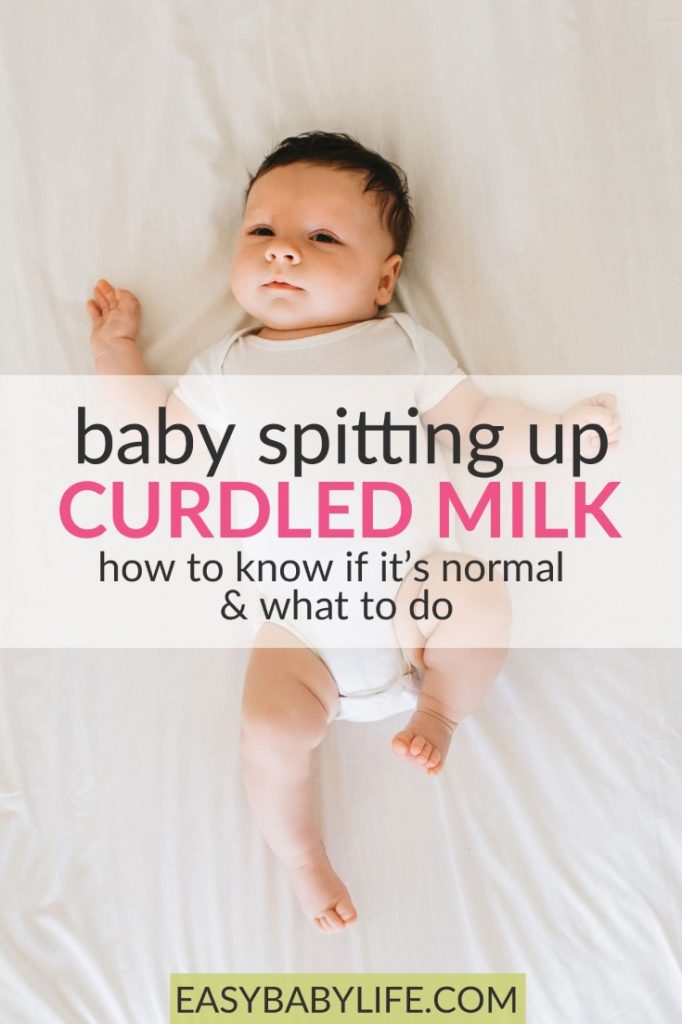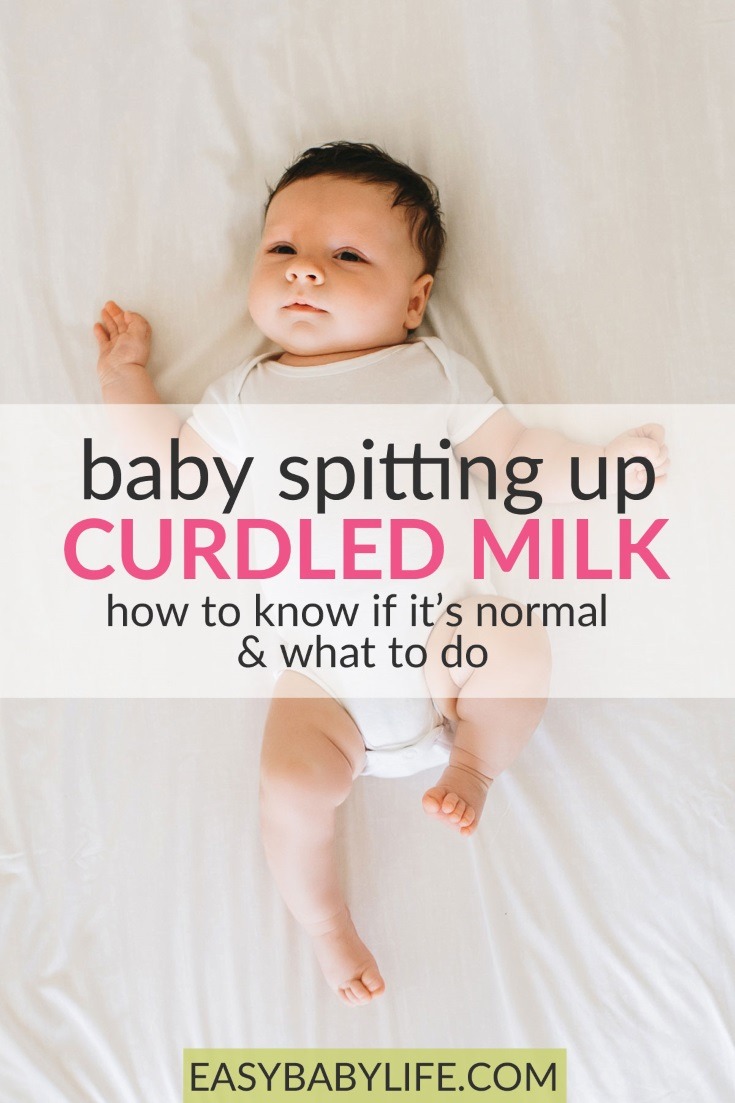Is your baby spitting up curdled milk? Or simply spits up a lot?
For both breastfed and formula-fed babies, this is often completely normal. Young babies tend to spit up due to their immature lower esophageal sphincter, and if the milk has been mixed with stomach acid, it will be curdled to some extent. However, there are possible illness-related reasons for curdled vomit, too, and it is important to know the difference.
We have asked one of the pediatricians in our medical team to explain when curdled milk spit-up is normal and not.

Mom’s question:
My baby boy is 5 weeks old. He is eating 4 oz every 3-4 hours. He is spitting up a lot. He was on breast milk, but after he was spitting up what looked like curdled milk, his doctor said to try formula. He is doing the same thing, so switching to formula didn’t help at all. I’m not sure what to try now.
Thanks,
Brandi (Sparr, FL)
In this article:
Why Do Babies Have Spit Ups?
As a baby breastfeeds or drinks infant formula, milk travels from the mouth into the esophagus and then enters the stomach through a muscle called the lower esophageal sphincter. This C-shaped muscle helps keep feedings, gastric acid, and digestive enzymes inside the stomach. At birth, however, the muscle is immature and does not tighten well enough to fully close. This allows ingested milk to flow back into the esophagus and sometimes out of the mouth or nose as a “spit up.”
50 percent of newborns and up to 70 percent of three to four-month-olds spit up throughout the day. By age six months, the lower esophageal sphincter becomes stronger and can keep feedings within the stomach much better. This is also the time many babies are introduced to solid foods, which can help mitigate the spit-ups. Once the baby’s digestive system has matured, most infants no longer have spit-ups by their first birthday.
Due to the immature lower esophageal sphincter, young babies easily spit up instead of simply burping if they swallow air (aerophagia) or if they laugh and play a lot with a full stomach. Another possible cause is aerophagia or swallowing too much air instead of milk. You’ll find tips on how to reduce spitting up for healthy babies further down the article, but it is important to remember that a majority of young babies spit up in any case.
Why Is the Milk Curdled When Babies Spit Up?

For babies that are fully breastfed or formula-fed, normal spit-up will look just like the formula or milk that he or she just had, or it may appear more or less curdled.
Both breastmilk and the cow’s milk used in infant formulas contain two protein components: casein and whey. Casein is the solid component that forms curds when combined with gastric acid and enzymes in the stomach, i.e., the milk becomes curdled when mixed with the stomach fluids. When parents notice curds in their baby’s spit-ups, they are seeing the partially digested casein. On the other hand, if your baby spits up immediately after swallowing, the milk will return like regular milk since the milk has not yet formed curds.
Human breastmilk curds are softer than cow’s milk curds, making them easier to digest. They pass out of the stomach and into the intestines faster. As a result, when breastfed infants spit up, the milk may look less curdled than for babies that are formula-fed.
How Do Spit Ups Differ from Vomiting?
The primary difference between spit-ups and vomiting is the amount of force that expels the milk. Vomiting occurs because of forceful stomach contractions, so the curdled milk is propelled away from the baby. It is also more episodic and may be associated with symptoms of illness such as abdominal discomfort, fever, or diarrhea. In cases of an allergic reaction, the vomiting may be associated with a rash, difficulty breathing, or facial swelling. Persistent vomiting can cause significant calorie loss, affecting weight gain and growth.
In contrast, spit-ups occur without force, and the baby is typically unbothered. The milk simply dribbles or pours out of the mouth. It often happens with position changes, for example, lying the baby down for a nap or tummy time. It may occur while burping the baby because of air bubbles in the stomach. Although the amount of milk expelled in a spit-up can appear excessive, it is usually a negligible amount. No weight loss or growth issues are associated with spit-ups.
How Do Spit Ups Differ from GERD?
When spit-ups are associated with discomfort, it is known as gastroesophageal reflux disease (GERD). The pain is due to irritation from stomach acids entering the esophagus together with the ingested milk. While experiencing reflux, these babies cry and are difficult to console. They may push away from the breast or bottle during feedings. Other babies, however, try to feed more frequently to “soothe the burn.” When feeding is difficult because of GERD, babies often don’t gain enough weight. Lying on the back for sleep, diaper changes, and other needs makes the pain worse, and babies may arch their backs to relieve the pain. Similar to normal spit-ups, babies with GERD can also expel curdled milk.
You’ll find several tips for feeding a baby with acid reflux here.. There is also medication available for severe acid reflux (GERD).
Note: Cow’s milk protein allergy and GERD can co-exist, and symptoms may be difficult to distinguish. Suspected cases of this type of allergy should be discussed with a doctor.
When Is It NOT Just a Spit Up?
There are medical situations during which curdled milk or other gastrointestinal fluids are expelled. These include acute illnesses and conditions that require immediate medical attention.
Pyloric stenosis
Similar to the lower esophageal sphincter at the top of the stomach, milk travels into the first segment of the small intestines through an outflow structure called the pyloric muscle. Some infants are born with a thickened pyloric muscle that does not open properly. As a result, it is difficult for partially digested (curdled) milk to pass along, causing the baby to vomit. The vomiting episodes are forceful and called “projectile” because the milk shoots across a room. Symptoms develop between ages three to six weeks of life. If unrecognized, babies become dehydrated and lose weight because of fluid and calorie losses. Pyloric stenosis requires surgical intervention to correct the obstructing muscle.
This video presents an explanation of pyloric stenosis:
Intestinal malformations
Any abnormality of the small intestines that blocks the passage of feedings can cause babies to vomit curdled milk or intestinal fluid (bile). Some of these problems are obvious at birth, while others can appear during the toddler years.
Duodenal Atresia
The first segment of the small intestines is called the duodenum. The stomach contents enter here before moving on to the mid-section of the intestines. Pre-digested, curdled milk is combined with bile from the gallbladder and enzymes from the pancreas for further digestion. If, during fetal development, the duodenum does not form properly, it remains closed off from the other portions of the intestines. It, therefore, ends abruptly, causing the baby to projectile vomit both curdled milk and bile after each feeding. These symptoms typically appear on day one or two of life. Surgical correction is always necessary. Up to 40 percent of infants with Down Syndrome have this birth defect.
You can watch the video below to learn more about the condition:
Malrotation
Sometimes, the middle or distal sections of the small intestines do not develop in the expected coiled formation during the second trimester of fetal life. If this occurs, they are subject to twisting in and out of place after birth, causing intermittent bowel obstructions. This bowel twisting motion causes enough pain for the baby to cry incessantly and vomit bilious fluid. Between these episodes, the baby may seem fine. Other symptoms may include a distended, tender belly or blood in the stools. A surgical procedure is usually necessary to place the intestines into the correct coiled formation within the abdomen.
Infections
Community-acquired infectious gastroenteritis is common, especially among infants who attend daycare. Most often, these infections are caused by a virus that irritates the stomach and intestines until it passes out of the gastrointestinal tract. Babies with such a tummy bug often vomit curdled milk because the infection slows transit out of the stomach. After fluid support with electrolyte replacement, most infections self-resolve. Bacterial or parasitic gastroenteritis is less common. Stool tests differentiate viral from other causes and help determine if medication is necessary.
Cow’s Milk Allergy
Cow’s milk allergy is a common childhood allergy. It occurs in 7% of babies under one year old but often resolves by five years of age.
It can lead to an immediate or delayed allergic reaction when consuming cow’s milk. For the immediate type of CMA, the infant experiences symptoms right after introducing the cow’s milk. In contrast, for the delayed type of reaction, the symptoms can be seen after several hours or days after the introduction of CM. The baby may experience one or more symptoms:
- rashes on the face or eyelids
- swelling of the face, lips, or around the eyes
- vomiting, abdominal colic, diarrhea, stomachache
- nasal congestion or runny nose
- severe symptoms include wheezing or difficulty breathing and swelling of the throat (these symptoms indicate a trip to the emergency room ASAP!)
As mentioned, GERD and cow’s milk allergy can have similar symptoms, and they can also co-exist. Contact your healthcare provider if you suspect an allergy.
Lactose intolerance is often mentioned to have similar symptoms as cow’s milk allergy. However, lactose intolerance is relatively uncommon in babies and typically does not lead to vomiting. You will find symptoms of lactose intolerance in this article.
When to Call a Doctor?

If it is unclear whether a baby is just spitting up or has a more serious problem, it is best to contact your healthcare provider.
Signs of concern include:
- Feeding frequently but requiring several breaks
- Spit-ups with inconsolable crying or irritability
- Crying while lying on the back that resolves when held upright
- Vomiting with or without diarrhea
- Vomiting that is projectile (shoots across a room)
- Blood in stools
- Belly pain that cannot be relieved
- Weight loss or poor weight gain/growth
- Signs of dehydration, including fewer wet diapers than usual
- Breathing difficulties (call a doctor or an ambulance, depending on the situation)
- The spit-up contains green or yellow fluid
- Your baby spits up blood or material that looks like coffee grounds (which is likely to be blood, and in this case, you need to take your baby to a doctor immediately)
Any of these symptoms can be a sign of a severe medical issue and should be addressed by a pediatrician or other healthcare provider.
How to Reduce Spit-Up Episodes
Curdled milk and “happy baby” spit-ups can be messy and a chore to clean up. Aside from keeping lots of bibs and burp cloths handy, there are a few ways to reduce spit-up frequency:
If possible, keep the baby upright for 20 to 30 minutes after feedings. This keeps the feeding in the lower portion of the stomach, allowing gravity to help the milk pass into the intestines.
Try not to overfeed the baby, especially during the first few months of life. Infant stomachs are pretty small, which is why younger babies need to eat every two to four hours. When babies drink more milk than their stomach size can accommodate, it is more likely to come back up.
Feed your baby before she is starving. A hungry baby will feed more aggressively and risk swallowing air or overfeeding.
Take a break to burp the baby during feedings. Infants swallow air in addition to breastmilk or formula, especially when taken from a bottle. If an air bubble forms within the stomach, it can easily propel the milk back into the esophagus and out of the mouth.
Avoid jostling or active play directly after feedings. Too much movement while the belly is full can cause more spit-ups.
Final Thoughts…
You and the doctor may have misunderstood each other because it should be the excessive spitting up rather than the curled milk that is the main problem and can be a sign of illness. If a baby is happy, feeding and growing well, and has no concerning symptoms, there is no need to worry about spit-ups of curdled milk. It is a normal and expected occurrence, especially under the age of six months. The milk will look curdled whether or not you are breastfeeding or formula feeding. It is not a cause for concern.
If you notice signs of illness, as explained above, or if you simply feel that your baby’s spitting up is too excessive, don’t hesitate to discuss the matter with a doctor.
Good luck!
Paula
Read Next

Research References
- Duodenal Atresia
- Approach to Pediatric Vomiting
- Vomiting in Children
- Intestinal Malrotation and Volvulus in Children
- Here are some indicators from Mayo Clinic of problematic excessive spitting up in babies
The information in this article is provided by Medical Doctor Leah Alexander to provide examples and knowledge to help parents dig deeper into their baby’s situation, not to offer a complete picture or a possible diagnosis.
Hey, parents, is your baby spitting up curdled milk too? Please help this mom by commenting below! Or share your own thoughts and worries!

Paula Dennholt founded Easy Baby Life in 2006 and has been a passionate parenting and pregnancy writer since then. Her parenting approach and writing are based on studies in cognitive-behavioral models and therapy for children and her experience as a mother and stepmother. Life as a parent has convinced her of how crucial it is to put relationships before rules. She strongly believes in positive parenting and a science-based approach.
Paula cooperates with a team of pediatricians who assist in reviewing and writing articles.








My daughter spit up all the time when she was
first born until about 8 months. I only breast fed, and I was worried
she was spitting up almost everything that was going in. We found the
problem to be reflux, and although she continued to spit up after the
medicine it wasn’t as much. Once you start her on foods she will be
better, but don’t stop breastfeeding!!
I think it’s very sad that a professionally
trained person such as a doctor would tell a mother not to breastfeed
her child because of spitting up. There are many factors…such as a cow
milk intolerance in your milk…so you would need to cut out diary
products.
Since you changed from breastmilk to formula…then the problem
would not stop there because formula is made mostly from cow milk. I
would advise switching back to breastmilk which can help your child
recover inside and out when dealing with problems in this big world such
as allergies. If you do not plan to switch back i would suggest a goat
milk formula base (goat milk digests in the human system within 2-4
hours…cow milk takes 8 and more) or at least try an organic formula or
soy based. Although these can be a little more, your baby would greatly
benefit from it.
Good luck and my advice it to find another
pediatrician! It has been medically proven for a very long time that
breast milk is what was designed for the infants ultimate help and
support during life. Babies do not even develop an immune system alone
for the first 6 months of life, they rely on yours to fight for them
during that time. Good luck!
Okay, if the baby is spitting up a lot I
would take the formula down a little bit like to 3.5 oz. My babies are
almost 4 months old and take 4 oz. every three hours. I do believe that
is too much for a five week old. Good luck!
.My baby is 3 month old.In his 2nd month he used to strain and cry,doc said he has colicaid for which doctor has prescribed colicaid.That helped.Recently 2 weeks back he vomited curdled milk and at times it used to be mixture of water and curdled milk or at times just water.Doc said he has reflux nd prescribed Domstal 1.5 ml 4 times a day for 5 days but i jst gave him for 2 days cos he seemed better.But since yesterday he is throwing up again. :(